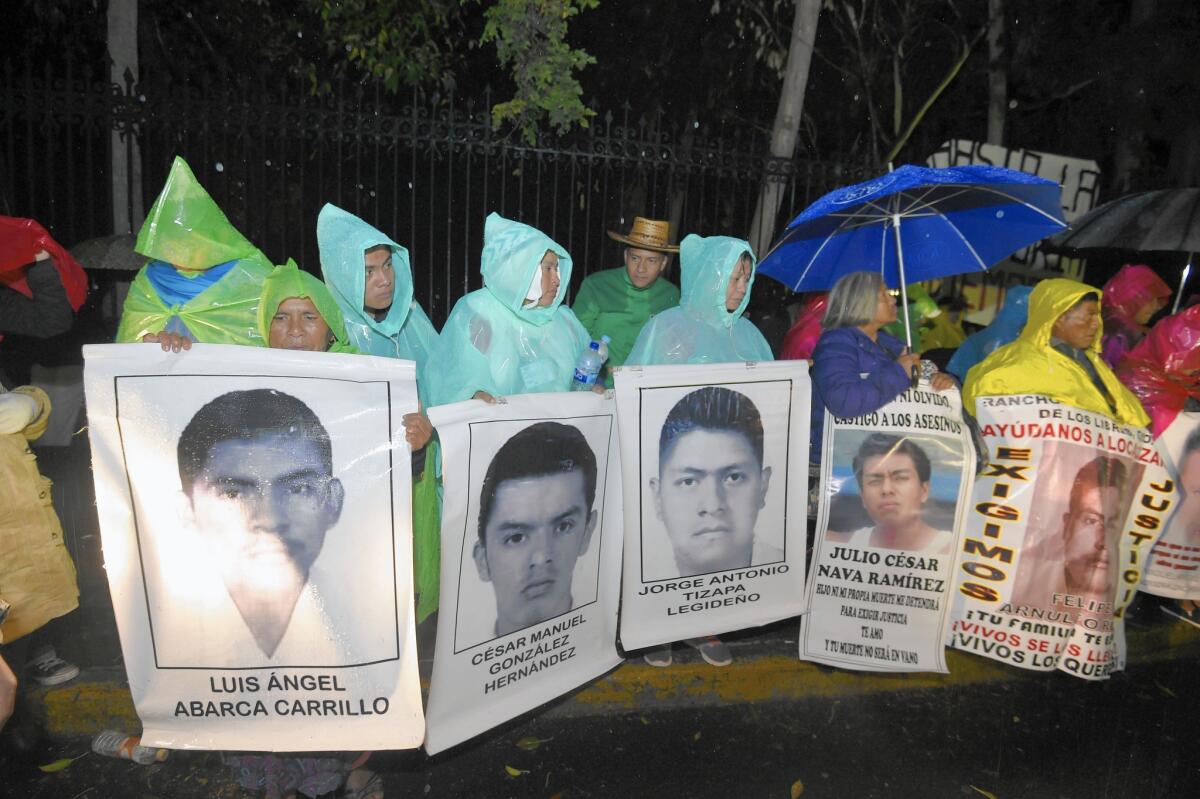Mexico crisis engulfs major institutions but hits the left hardest

- Share via
Reporting from Mexico City — When a president is in crisis, it is usually a propitious time for political opponents to pounce. But in Mexico, the controversies, failings and crisis of confidence engulfing President Enrique Peña Nieto have tarred not just his 2-year-old administration but the entire political establishment.
No party has emerged unscathed, nor barely an institution, including universities and the traditionally respected military. The attitude is a general pox on all their houses.
And no political realm has suffered more than the left, some of whose politicians have been exposed as corrupt and in cahoots with drug traffickers. The mayor in Guerrero state who is accused of having ordered the police attack that led to the likely slaying of 43 college students hailed from the main leftist party, the Democratic Revolution Party, or PRD.
And so did the now-disgraced governor of the state, who is believed to have turned a blind eye to the collusion of local politicians with drug traffickers and has been forced to resign.
That goes a long way in explaining why the left has not been able to capitalize on the unrest and widespread protests against Peña Nieto’s Institutional Revolutionary Party, or PRI, government, even though public demonstrations have been filled with revolutionary slogans and the kinds of demands for justice favored by the left.
A founder of the PRD and its two-time presidential candidate, Cuauhtemoc Cardenas, quit the party last month in disgust over how it was being run. Its other prominent leader, Andres Manuel Lopez Obrador, who now has a separate leftist party, has remained unusually quiet.
All this may doom the left, struggling and divided for years and unable to score major electoral victories. Carlos Navarrete, president of the PRD, told a Mexican newspaper that the level of corruption of some PRD-led cities, including those in Guerrero, was worse than he had imagined. Privately, a senior PRD leader acknowledged not having a clear strategy for rescuing the party.
And with much of the public still disenchanted with the other main opposition party, the conservative National Action Party, after its 12 years in the presidency, Mexicans are largely deprived of any real political alternative if they want to unseat the PRI.
A major test of that will come in 2015 midterm federal and state elections. Mexicans will vote for all 500 members of the lower house of Congress and for governor in nine states. The PRI had been expecting something near a clean sweep, but that now seems less certain.
“What’s the alternative?” asked Adrian Morales, a hairdresser marching in a huge street demonstration through Mexico City late last month. “The left is completely burned. And I think that if the PRI wins big again, people will be very angry and things could get very ugly.”
The immediate result has been a plummeting in the popularity of Peña Nieto and nearly all political institutions, according to the latest polling. In addition to the probable massacre of the students, the clear connection between politicians and organized crime and perceptions that authorities handled the case poorly, Peña Nieto and members of his inner circle have also been hit with allegations of conflict of interest in the awarding of lucrative public-works contracts.
A survey released this month by GEA-ISA found the president’s disapproval rating had soared to 52%, the highest in his tenure and more negative than those of his two predecessors at this point in their terms. Asked about the president’s credibility, 38% of respondents said they did not believe Peña Nieto “one bit.”
But even worse is the significant drop in confidence for all institutions in the last three months, said Guillermo Valdes, an executive at GEA-ISA.
“What worries us the most … is the growing distance between the political and the public,” said Valdes, who was head of domestic intelligence in the administration of former President Felipe Calderon.
“The most serious [phenomenon] is that people are losing sight of democracy as the institutional vehicle for changing things,” Valdes said. “People are distancing themselves from politics, from institutional channels which should be the way to solving these crises.”
That could lead to political violence, experts say, or, at the least, to a potentially destructive apathy. The GEA-ISA survey measured “intention to vote” at 31%, meaning that if elections were held now, Mexico would see an abstention rate virtually unheard of in its modern history.
“The problem behind every problem is corruption,” said Max Kaiser, a Mexican academic. He was a member of a coalition of 32 civic organizations that last week demanded that Peña Nieto create an independent corruption watchdog, not a government-dependent body that the president has proposed.
“The political class wants this subject to go away because it’s uncomfortable,” Kaiser said.
Even the generally conservative Roman Catholic Church in Mexico, which often stays on the sidelines of national controversies, has scolded officials for their inability to confront the nation’s problems.
“Our country is in crisis,” the Mexican bishops’ conference said. “Inequality, injustice, corruption, impunity, the complicities and the indifference have plunged us into violence, fear and desperation.”
More to Read
Sign up for Essential California
The most important California stories and recommendations in your inbox every morning.
You may occasionally receive promotional content from the Los Angeles Times.














